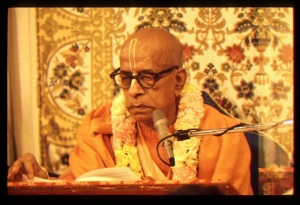CC Adi 13.1 (1975)

A.C. Bhaktivedanta Swami Prabhupada
TEXT 1
- sa prasīdatu caitanya-
- devo yasya prasādataḥ
- tal-līlā-varṇane yogyaḥ
- sadyaḥ syād adhamo 'py ayam
SYNONYMS
saḥ—He; prasīdatu—may bestow His blessings; caitanya-devaḥ—Lord Śrī Caitanya Mahāprabhu; yasya—of whom; prasādataḥ—by the grace; tat-līlā—His pastimes; varṇane—in the description; yogyaḥ—able; sadyaḥ—immediately; syāt—becomes possible; adhamaḥ—the most fallen; api—although; ayam—I am.
TRANSLATION
I wish the grace of Lord Caitanya Mahāprabhu, by whose mercy even one who is fallen can describe the pastimes of the Lord.
PURPORT
To describe Śrī Caitanya Mahāprabhu or Lord Śrī Kṛṣṇa, one needs supernatural power, which is the grace and mercy of the Lord. Without this grace and mercy, one cannot compose transcendental literature. By dint of the grace of the Lord, however, even one who is unfit for a literary career can describe wonderful transcendental topics. Description of Kṛṣṇa is possible for one who is empowered. Kṛṣṇa-śakti vinā nahe tāra pravartana (Cc. Antya 7.11). Unless endowed with the mercy of the Lord, one cannot preach of the Lord's name, fame, quality, form, entourage and so on. It should be concluded, therefore, that the description of Caitanya-caritāmṛta by Kṛṣṇadāsa Kavirāja Gosvāmī manifests specific mercy bestowed upon the author, although he thought of himself as the most fallen. We should not consider him fallen because he describes himself as such. Rather, anyone who is able to compose such transcendental literature is our esteemed master.